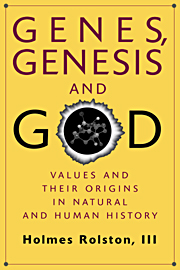Book contents
- Frontmatter
- Contents
- Preface
- Chapter 1 Genetic Values: Diversity and Complexity in Natural History
- Chapter 2 Genetic Identity: Conserved and Integrated Values
- Chapter 3 Culture: Genes and the Genesis of Human Culture
- Chapter 4 Science: Naturalized, Socialized, Evaluated
- Chapter 5 Ethics: Naturalized, Socialized, Evaluated
- Chapter 6 Religion: Naturalized, Socialized, Evaluated
- References
- Index
Chapter 1 - Genetic Values: Diversity and Complexity in Natural History
Published online by Cambridge University Press: 05 June 2012
- Frontmatter
- Contents
- Preface
- Chapter 1 Genetic Values: Diversity and Complexity in Natural History
- Chapter 2 Genetic Identity: Conserved and Integrated Values
- Chapter 3 Culture: Genes and the Genesis of Human Culture
- Chapter 4 Science: Naturalized, Socialized, Evaluated
- Chapter 5 Ethics: Naturalized, Socialized, Evaluated
- Chapter 6 Religion: Naturalized, Socialized, Evaluated
- References
- Index
Summary
Any account of genesis on Earth must place genes on the scene of global natural history. Nothing is more central to the contemporary neo-Darwinian view than an emergence over time of diversity and complexity, and genes are critical in this historic composition. Yet these developing phenomena, evident and indisputable though they are as fact of the matter, are subject to vigorous dispute about what is going on, a scientific issue laden with deeper philosophical significance.
NATURAL HISTORY: DIVERSITY AND COMPLEXITY
Something is learned across evolutionary history: how to make more diverse and more complex kinds. These events on Earth stand in marked contrast with events on other planets, such as the gases that swirl around Jupiter or the winds that blow on Venus. Even on Earth there is no such learning with the passing of cold and warm fronts; they just come and go. With the rock cycle, orogenic uplift, erosion, and uplift again, there is no natural selection. Nothing is competing, nothing is surviving, nothing has adapted fit. Climatological and geomorphological agitations continue in the Pleistocene period more or less as they did in the Precambrian. But the life story is different, because in biology, unlike physics, chemistry, geomorphology, or astronomy, something can be learned.
In result, where once there were no species on Earth, there are today five to ten million. On average and environmental conditions permitting, the numbers of life forms start low and end high.
- Type
- Chapter
- Information
- Genes, Genesis, and GodValues and their Origins in Natural and Human History, pp. 1 - 53Publisher: Cambridge University PressPrint publication year: 1999



